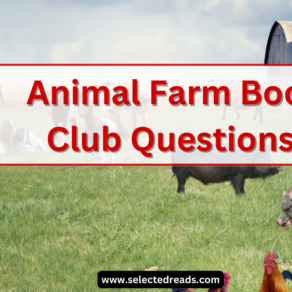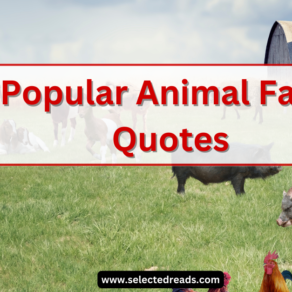Animal Farm is one of the best works of George Orwell. I have read it twice and it is captivating every time. It has plenty of important lessons to teach us, one of the most significant being that we must strive for equality and freedom in order to prevent exploitation and corruption. The story serves as a reminder that if we do not stay vigilant against those who wish to oppress us, then our hard-won freedoms can be taken.
In this blog post, I share with you a summary of the story together with an analysis of the the main characters in Animal Farm and their symbolic meanings.
For quotes from the novel, check out my post, popular Animal Farm quotes, and for discussion questions check out Animal Farm Book Club Questions.
Animal Farm Summary
“Animal Farm,” a politically charged novella by George Orwell, delves into the intricacies of revolution, power dynamics, and the corruption of ideals. Published in 1945, this allegorical tale utilizes a group of animals who rebel against their human master to examine the rise and fall of the Soviet Union and the dangers of totalitarianism.
Set on Manor Farm in rural England, the story begins with the farm’s animals suffering under the abusive and negligent owner, Mr. Jones. Inspired by Old Major, a wise and visionary boar, the animals dream of a world free from human oppression and envision a society based on equality and cooperation. After Old Major’s death, the animals, led by the intelligent pigs Snowball and Napoleon, successfully overthrow Mr. Jones and establish a new society based on the principles of Animalism.
The Seven Commandments of Animalism, inscribed on the barn wall, serve as the foundation for this new society, emphasizing the importance of solidarity and the collective good. However, as the animals work to create their utopia, power struggles and the corrupting influence of authority become increasingly apparent.
Snowball and Napoleon quickly emerge as the farm’s leaders, but their differing ideologies and methods soon lead to conflict. Napoleon, a ruthless and cunning pig, ultimately seizes control by expelling Snowball with the help of his loyal and fearsome dogs. Under Napoleon’s rule, the once-egalitarian society begins to devolve into an autocracy.
Napoleon, assisted by the manipulative pig Squealer, uses propaganda and fear to maintain his control over the other animals. The Seven Commandments are gradually altered to suit the needs of the ruling pigs, who indulge in human luxuries and exploit the labor of the other animals. This betrayal of the original principles of Animalism is epitomized when the commandment “All animals are equal” is amended to “All animals are equal, but some animals are more equal than others.”
As the pigs continue to consolidate power and resemble their human counterparts, the other animals are left disillusioned and oppressed, their dreams of an equitable society shattered. The final scene, in which the pigs and human farmers toast to their mutual exploitation of the animals, highlights the cyclical nature of tyranny and the inevitable corruption of power.
Through its vivid portrayal of complex characters and its exploration of political themes, “Animal Farm” serves as a cautionary tale about the perils of revolution and the consequences of abandoning one’s principles in pursuit of power. The story’s allegorical nature allows it to transcend its historical context, providing insight into the nature of power and oppression that remains relevant today.
In conclusion, George Orwell’s “Animal Farm” is a compelling allegory that exposes the dangers of totalitarianism and the corruption of ideals. By examining the rise and fall of a society founded on the principles of equality and cooperation, the story underscores the importance of vigilance against the corrupting influence of power and the necessity of holding true to one’s principles in the face of adversity.
Animal Farm Characters
George Orwell’s “Animal Farm” features a cast of memorable characters that symbolize different aspects of the political allegory. The main characters in the story are:
1. Old Major: An elderly and respected boar, Old Major represents the ideals of socialism and the spark that ignites the rebellion. He is a symbol of both Karl Marx and Vladimir Lenin, the architects of communism.
2. Napoleon: A large and ambitious Berkshire boar, Napoleon is one of the main leaders of the rebellion. He becomes the tyrannical ruler of Animal Farm, symbolizing Joseph Stalin and the dangers of totalitarianism.
3. Snowball: A smart and charismatic pig, Snowball is Napoleon’s main rival for power. He is an idealist who genuinely believes in the principles of Animalism but is eventually driven off the farm by Napoleon. Snowball represents Leon Trotsky, a key figure in the early Soviet Union who was later exiled by Stalin.
4. Squealer: A persuasive and manipulative pig, Squealer is Napoleon’s right-hand man and the farm’s chief propagandist. He represents the perversion of language and the manipulation of truth in the service of authoritarian power, symbolizing the Soviet Union’s propaganda machine.
5. Boxer: A loyal and strong workhorse, Boxer is the embodiment of the working class. His unwavering dedication to the cause and blind trust in the leadership eventually lead to his tragic downfall, illustrating the exploitation of the proletariat under totalitarian regimes.
6. Clover: A gentle and motherly mare, Clover is another representation of the working class. She is loyal to the principles of Animalism but becomes disillusioned by the pigs’ corruption, symbolizing the internal conflict experienced by many under oppressive systems.
7. Benjamin: A cynical and intelligent donkey, Benjamin remains largely detached from the events unfolding on the farm. His skepticism and reluctance to engage in the political struggle serve as a commentary on the dangers of political apathy.
8. Moses: A tame raven, Moses is a symbol of organized religion. He preaches about a utopian place called Sugarcandy Mountain, where animals go after death, and serves as a tool for the pigs to control the other animals by offering them false hope.
9. Mollie: A vain and self-centered mare, Mollie represents the bourgeois class, who are more interested in personal comforts and material possessions than in the collective good.
10. Mr. Jones: The original human owner of Manor Farm, Mr. Jones symbolizes the oppressive ruling class that the animals seek to overthrow. His character is often associated with the Russian Tsar Nicholas II, who was overthrown during the Russian Revolution.







